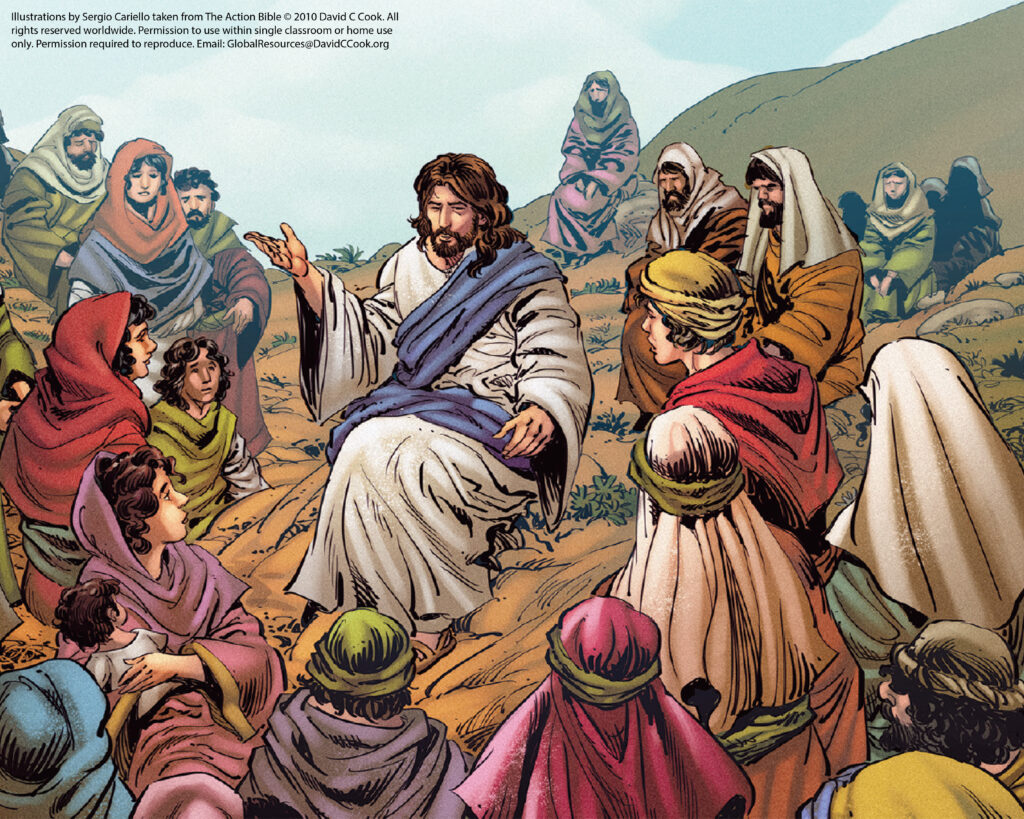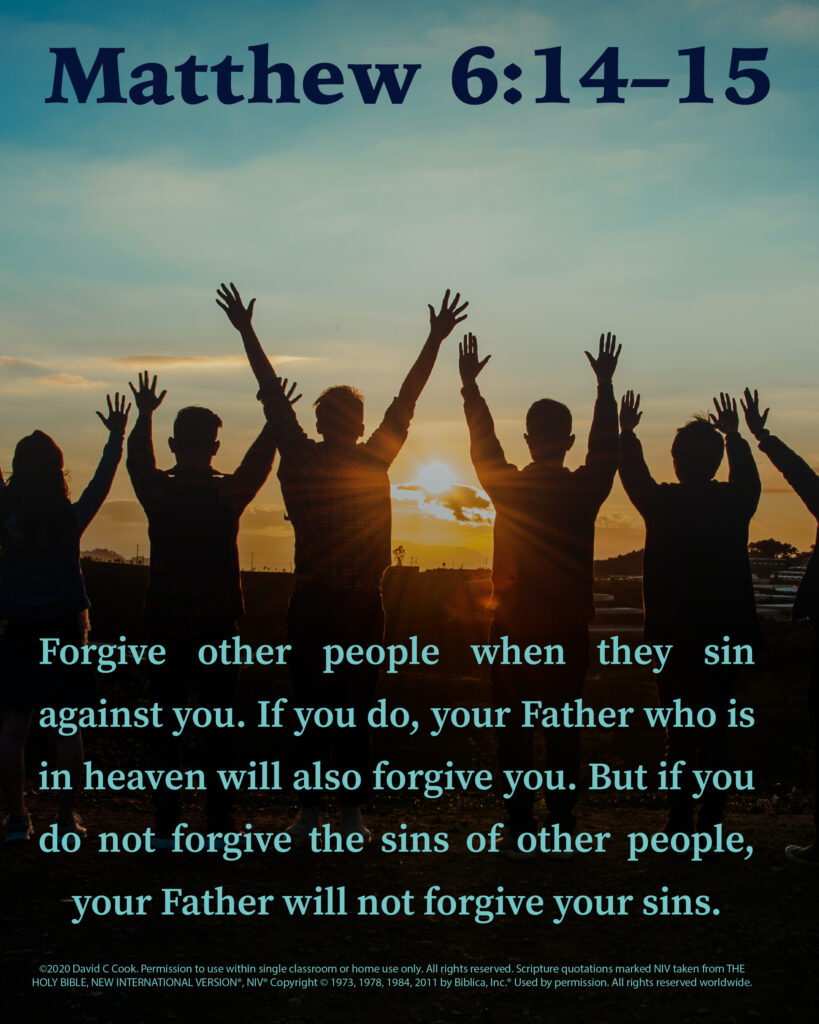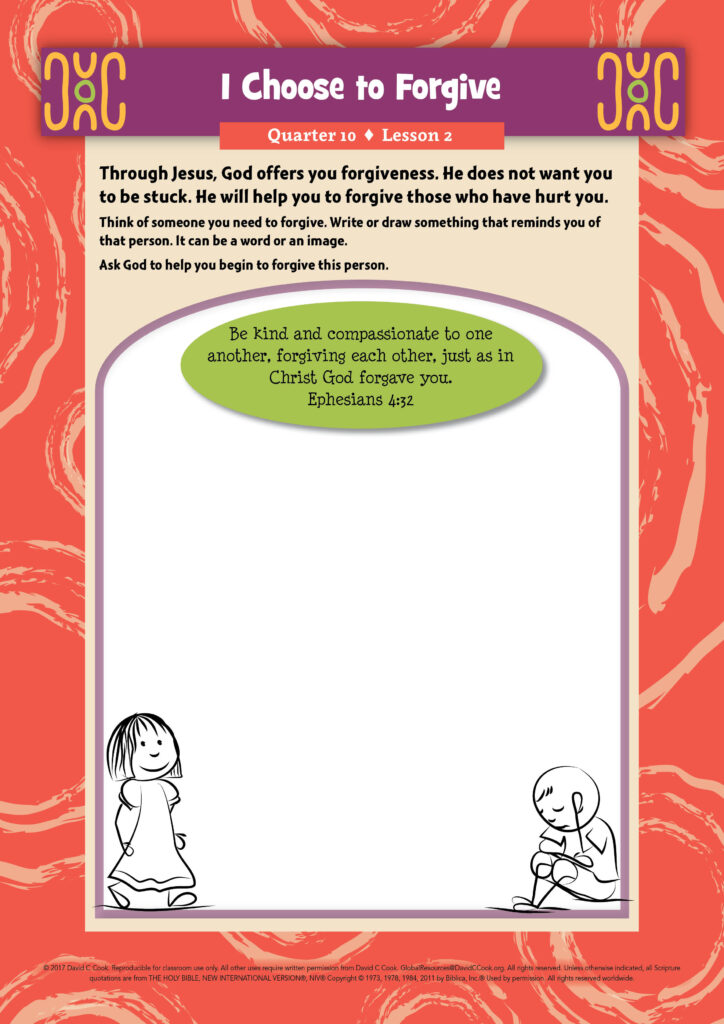During the lesson, the information for you to know is written in regular type, and what we suggest speaking or reading aloud to children is in bold. All resources for this lesson, including the Teacher Guide, Student Page, Family Connection Card, and other resources can be downloaded in a ZIP file by clicking on the following link:
In some lessons you will find "resource articles." These are articles written by experts from around the world to help equip you for your work with children and adolescents. Share them with parents or guardians if you consider it appropriate.
Forgive other people when they sin against you. If you do, your Father who is in heaven will also forgive you. But if you do not forgive the sins of other people, your Father will not forgive your sins.
Matthew 6:14–15, NIrV
When someone has hurt us, it is easy to focus on the pain and offense we have suffered. It is tempting to think about how we were wronged and how bad the other person is. It is tempting to think that it is right for us to hold on to that pain and not forgive the person. We do not think that what that person did is worthy of forgiveness.
But Jesus’ words challenge these human feelings. He says that if we do not forgive others, then God will not forgive us. That is hard to hear. Think of all of the sin you have done throughout your life. Think about the fact that God has chosen to forgive you for the offense of each of them.
Think about someone who has hurt you, someone you have not forgiven. Now ask yourself if you can forgive her. God has forgiven you; can you forgive her? Ask God to help you forgive this person. He can help you choose to forgive just as He has forgiven you.
Let your children’s families know that this week their children are learning that we can choose to forgive because God forgives. Encourage families to ask their children what that means.
Teacher Tip: If possible, email or text the Family Connection Card to the families of your students.
Greet your children warmly by name as they arrive. Let them know that in today’s lesson they will learn more about forgiveness. Have the children line up side by side at one end of your space. Stand on the opposite side of the space.
Tell the children that when you shout “Forgiving,” everyone will take a step forward with his palms open in front of him, as though receiving a gift. With each step, the children will say, “I accept.”
When you shout “Unforgiving,” everyone will crouch down and put her arms over her head. The children cannot move until you shout “Forgiving” again. The first child to cross the finish line is the winner.
Begin the game, alternating when you say “Forgiving,” or “Unforgiving.” When the game is over, have everyone sit down.
Who can tell us what it means to forgive?
Allow 2–3 children to share their ideas before sharing the information below.
To forgive is to let go of a hurt or offense that was done to us. As we learned last week, forgiveness begins with God.
When we forgive, we recognize that a wrong was done, but we choose to let go of the pain. We choose to not hold a grudge. Christians choose to trust God with our pain and with the consequences for that wrong. Choosing to forgive does not mean that what happened to us is right. But when we forgive someone, it helps us begin to heal from the wrong that was done to us.
In our game, when I shouted “Forgiving,” you moved forward with your hands out and said, “I accept.”
How do you think this is like forgiveness?
Forgiveness helps us move forward.
How do you think being unforgiving is like crouching down with our arms over our heads?
We become stuck where we are and cannot move forward.
When we accept God’s forgiveness, we are free to move forward. But we also need to forgive others. Our response to God’s forgiveness should be to forgive others. When we do not accept God’s forgiveness, it can be as if we are crouched down, unable to move forward. In the end, we hurt ourselves and often others.
When something wrong has been done to us and we do not forgive, our lives are still stuck, as we were stuck in the game. When a wrong has been done, sometimes we hate the person who hurt us. Or we may think about how we would like to hurt that person back. While these are very normal emotions, God has a better way that will set us free to move forward. Remember that forgiving does not mean that what happened was okay. Part of forgiving someone is recognizing that a wrong was done.
God wants you to forgive those who hurt you. This is not always easy to do. Today, we will learn about how to forgive people who hurt us. God wants to lift us up from the crouched position and set us free to move forward.
God has forgiven us, and He wants us to forgive others. Remember that no one deserves forgiveness. We choose to forgive because God has shown us how to forgive.
Optional: If possible, share the image from The Action Bible.

Jesus told His disciples a parable or teaching story about forgiveness. I need 3 volunteers to act it out. One volunteer will play the king. The other volunteers will play Servant 1 and Servant 2. They will silently act out the story as I tell it.
Place a chair at the front of your space. Invite the 3 volunteers to stand on one side of it. Tell the rest of the children to listen carefully to the story. If they are happy with what the characters are doing, they will whisper “Yay!” If they are unhappy with what the characters are doing, they will whisper “Boo!”
There was a great king, and he had many servants. One day, the king was sitting on his throne. (Direct the king to sit in the chair.)
The king called in a servant who owed him a large amount of money. (Direct Servant 1 to come before the king.) Even if he worked his entire life, the servant could not earn enough to repay his huge debt. (Direct Servant 1 to motion no while showing empty hands to the king.)
So the king ordered Servant 1, his wife, and his children to be sold as slaves in order to pay back the huge debt. The servant fell to his knees and begged the king for mercy. (Direct Servant 1 to fall on his knees and beg.) “Please, please, please be patient with me, and I will pay back everything.”
The king had pity on Servant 1 and forgave that huge debt. Servant 1 did not owe anything to the king anymore. How wonderful! The king had made him a free man.
As Servant 1 walked away he met Servant 2. (Direct Servant 1 to meet with Servant 2.)
Servant 2 owed Servant 1 a small amount of money. If he worked for about 100 days, he could earn enough money to pay back his debt. Servant 1 demanded his money now, but Servant 2 could not pay. Servant 2 fell to his knees and begged Servant 1 to be patient with him and give him more time to pay back the money. (Direct Servant 2 to fall on his knees and beg.)
Servant 1 refused to forgive the other servant and had him thrown into prison. He told Servant 2 he would have to stay in prison until he could repay the debt.
When the king’s other servants saw how Servant 1 had treated Servant 2, they told the king. The king ordered Servant 1 to come before him. (Direct Servant 1 to come before the king again.)
The king was very angry with Servant 1 and said, “You wicked servant! I forgave all of your huge debt, but you did not forgive your fellow servant a small debt.”
Direct the king to look very angry. Encourage the other children to respond with “Boo” or “Yay” depending on how they feel at this point in the story.
The king threw Servant 1 into prison. He said, “You will stay here until you pay back everything you owe me.”
Clap for the actors and have everyone sit back down.
Why do you think Servant 1 did not forgive the other servant?
This story about the king and the servants is a parable. A parable is a story that teaches us something. Jesus shared many important truths this way. His parables made it easier for us to understand the important things He was saying.
Who do you think the king represents in this parable?
If necessary, guide the children to understand that the king represents God.
Who do you think the servants represent?
If necessary, guide the children to understand that the servants represent every person.
God has forgiven us, just as the king forgave the servant. And, just like the servant, we need to forgive others because we have been forgiven. Listen to what Jesus said:
If you are using the Memory Verse Poster, show it to the students.
Forgive other people when they sin against you. If you do, your Father who is in heaven will also forgive you. But if you do not forgive the sins of other people, your Father will not forgive your sins.
Matthew 6:14–15, NIrV

Remember that when we hurt others or are hurt by them, our relationships are broken. Without forgiveness, the relationship cannot be healed. Sin—doing or thinking something wrong—not only breaks our relationships with others, but it also breaks our relationship with God. In these verses, Jesus tells us that unless we forgive others, God will not forgive us. That is a very strong warning! God does not want us to be stuck. He wants us free to move forward.
When someone has hurt us badly, it is almost impossible to forgive without God’s help. Sometimes we are hurt by someone close to us such as a family member. That person may have hit us or touched us in the wrong way. Remember that forgiving someone does not mean that what happened was right. It does not mean that you must be in close relationship with the person who hurt you. But it does mean that you will be freed to move forward in life.
God can help you forgive the person who hurt you. He offers forgiveness to you through Jesus, and He can help you forgive those who hurt you. When you choose to forgive with God’s help, His love begins to wash the pain from your life.
Forgiveness does not happen in a minute. Sometimes it does not happen in a week or a month or even a year. Forgiveness is a process of healing. Sometimes we think we have forgiven a person. Then we start remembering what happened, and we feel all the anger and pain again. This is normal, especially if you have been hurt and angry for a long time.
If you realize your anger and pain are coming back, ask God to help you continue to forgive. Try to fill your mind with other things that make you feel happy and peaceful, such as Bible verses you know or worship songs. You can even play a game in your mind to help you stop reliving the bad thing. For example, try to say the names of everyone who lives near you very fast. Or you might count backwards from 100 to 1. These things can help keep you from being stuck in memories of that pain.
As we just heard, forgiveness can take time. Listen to this true story that happened to a teacher in India and a 10-year-old boy. This happened after they studied this lesson.
The teacher was preparing to teach this lesson, but she had tears in her eyes and could hardly see the words. She told God, “I cannot teach this lesson on forgiveness because I have never forgiven my mother.” Her mother had taken her to an orphanage and left her there. “My mother told me she would come back to get me, but she never did. I never saw her again,” the teacher said to God. “Now I am grown up, and my hatred for her is still hurting me. I know You want to help me to forgive her, and I want that, too.” As she prayed God helped her start the process of forgiving her mother.
The teacher later taught the lesson at an orphanage. After class, a new boy came up to her and said, “This is the first time I have ever heard of forgiveness. I did not know there was such a thing as forgiveness.” He explained that when he was a baby, his father killed his mother. He went to live with his grandmother. She would wake him every morning and say, “Eat all your food. Grow strong. When you are a grown man, you will find your father and kill him because he killed your mother.” The boy believed that was his purpose in life. When his grandmother died, he was sent to the orphanage.
He told his teacher, “I heard you say that God can help me forgive others who hurt me. I still want to find my father when I grow up. But I want to tell him that God forgives him and I do too.”
Forgiveness is powerful, and it sets you free!
Optional Supplies
Give paper and pencils to the children. Ask them to think of someone they need to forgive. The children will write or draw something on the papers to remind them of the people they need to forgive.
These things will be very sensitive for your children. Suggest they draw a picture of a teardrop or a broken heart or write the word “pain” on the papers. No one else will know who they are thinking about, but they will.
If you are using the Student Pages, there is space for children to respond to the lesson on them.
End of Option

The first step to forgiving someone who has hurt you is to recognize that a wrong was done. We are going to express that now to a partner and to God.
Have the children pair up, girls with girls and boys with boys. If you have an uneven number of children, there can be a group of 3 children.
Everyone will take turns with your partner to share a pain you have from a wrong someone has done to you. It may be something little or something big. You will not use words, but instead use your body and face to express your pain. For example, if someone close to me lied to me, I may feel hurt and angry. I may show that by stomping my foot and covering my ears.
After you have expressed that pain, your partner will comfort you in some way. She might comfort you by praying for you, patting your back, or giving you a hug. Then the partner will have a turn to express her pain to you. Remember that you will not use words but only show your pain using your body and face.
Allow the pairs about 5 minutes to share with each other. After the pairs have had time to share, ask the children to stand.
It is important to tell God the hurt that was done to you and that you need His help to forgive. He saw you express your pain to your partner. He wants to comfort you too. He wants to help you move forward.
If you are ready to ask God to help you forgive that person who hurt you, take a step forward. If you are not yet ready to forgive, but you want to be able to forgive and move forward, take a step forward. Remember that forgiving someone does not mean that what happened to you was okay.
Pause while the children respond. Close class by speaking the following blessing based on Ephesians 4:32 over the children.
Blessing: God loves you and wants you to experience the freedom of forgiveness. May you ask Him to help you forgive those who hurt you. May He fill you instead with kindness and compassion.
Lead the children in singing this quarter’s song, if possible.
Life on Life ©2020 David C Cook. Reproducible for home or classroom use only. All other uses require written permission from David C Cook [email protected]. All rights reserved.